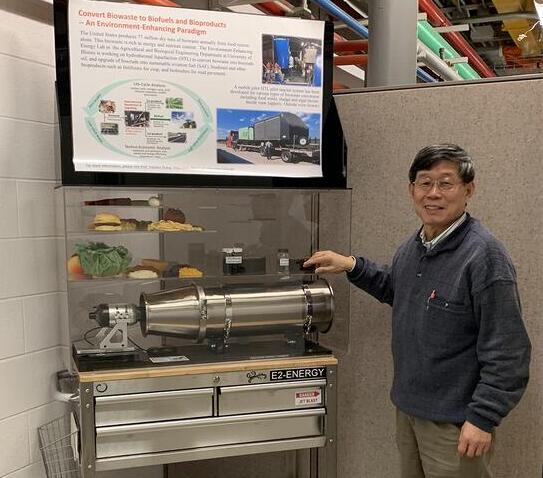U of I researchers receive major USDA grant to convert biowaste into pavement

URBANA, Ill. – A team of University of Illinois researchers received a $2.5 million USDA grant for a project to explore conversion of food waste and swine manure into pavement binder and transportation fuels.
The proposal, “Pave the way: From Organic Waste to Renewable Roads With Advanced Resource Recovery Delineation (FORWARD),” is one of three projects funded through USDA’s National Institute of Food and Agriculture’s (NIFA) Bioproduct Pilot Program, which supports research and development of value-added products from agricultural commodities to enhance a circular bioeconomy.
“Many of our daily-life products are created from derivatives of crude oil. That includes not only fuel, but also lubricants, heating oils, asphalt, and plastics. Petroleum will eventually run out, and we need to find alternatives that are recyclable and renewable,” states Yuanhui Zhang, Founder professor of agricultural and biological engineering (ABE) and principal investigator on the grant. The team also includes Paul Davidson and Cody Allen, ABE, Ramez Hajj, Civil and Environmental Engineering and Yalin Li, Institute for Sustainability, Energy and Environment (iSEE).
“We will use a hydrothermal liquefaction (HTL) reactor system to convert biowaste into biocrude oil through a high-temperature, high-pressure process. This mimics petroleum formation in nature, where biowaste buried deep underground gradually turns into crude oil over millions of years. In the HTL reactor, the process takes less than an hour,” Zhang explains.
The main output from the HTL reactor is biocrude oil, which will be separated into transportation fuel and a biobinder that can be mixed with gravel to create asphalt for road pavement. The HTL wastewater, which is high in nutrients, can be recovered for use as fertilizer. The researchers will also evaluate the viability of the process via technoeconomic analysis (TEA) and life-cycle analysis (LCA).
Every year, the U.S. produces millions of tons of food and agricultural waste, costing billions of dollars for collection and management. Creating bioproducts can help reduce the high costs of managing waste, mitigate adverse environmental impact, and sustain economic development. Recycling biowaste can also lead to a significant reduction in landfills, which often are disproportionately located in underserved communities.
“Adopting a more circular economy ensures that wealth and other economic benefits in the form of jobs and other opportunities are created, and stay, in rural communities,” says U.S. Agriculture Secretary Tom Vilsack in a press release from NIFA announcing the grants. “We must support and incentivize practices like these, because it’s what consumers want — and what farmers, and our planet, need.”
The Department of Agricultural and Biological Engineering is in the College of Agricultural, Consumer and Environmental Sciences and The Grainger College of Engineering at the University of Illinois.